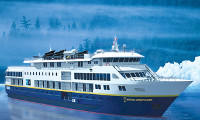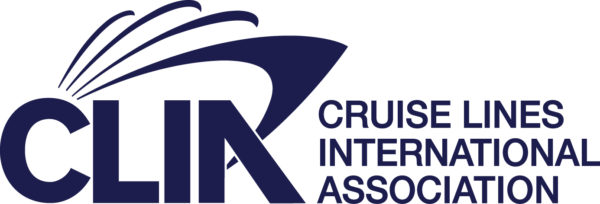Ships

 National Geographic Quest
National Geographic Quest
Dining
Food served aboard is fresh, local, and delicious, and sourced from suppliers who share our values of sustainable use whenever possible. Meals aboard are almost always served in the dining room, located aft of the lounge deck. When weather conditions allow, lighter fare may be served on the observation deck. There is no assigned seating and our dining room accommodates the entire expedition community in a single seating. During meals your expedition leader, naturalists, and any guest speakers aboard will join you.
Public spaces
National Geographic Quest was designed with 50 years of expedition heritage. The ship features a specially-designed, open bow and an observation deck for gathering to watch for wildlife or enjoy an evening cocktail with friends in the open air. An elevator access all decks, and public restrooms are available on every deck.
Bridge:
You're invited to the ship's bridge to see the calm business of navigation unfold. Ask the watch officer questions about navigation. Or, help yourself to the ever-ready binoculars to scan the horizon for whale spouts. There may occasionally be times when the bridge must be restricted to shipboard personnel only.
Lounge:
The lounge is the heart of our expedition community, here we hold cocktail hour and Recap each evening. It's also where you'll gather for presentations, photography talks, and guest speaker presentations. Seating design takes advantage of the wraparound windows for an optimal view, and boasts multiple high-definition screens for slideshows and videos. Forward lounge doors provide direct access to the bow. There's also a small reference library and board games and cards are also available.
Bar:
The bar is typically open from 11 a.m. until one hour after lunch begins and from 5 p.m. until closing. A variety of beverages are available for purchase including wine by the glass or bottle, cocktails, specialty drinks, and spirits. There is also a 24-hour self-service beverage station with coffee, tea, soft drinks, beer, water, ice, and snacks. The drinking age aboard the ship is 21.
Sundeck:
Morning stretch classes are held in the open air of the sundeck, located aft on the observation deck. After stretch class the deck is set with tables and chairs, and lounge chairs.
Bow:
National Geographic Quest's specially-designed bow observation area accommodates the entire expedition community at once for a shared wildlife viewing experience.
Mud room:
Located aft on the main deck where you will embark and disembark expedition landing craft, the mud room has lockers that provide convenient gear and boot storage.
Wellness aboard
Making daily discoveries and exploring the wild world is naturally uplifting. Your wellness specialist will help make your expedition relaxing as well as revitalizing. Greet the day with a light exercise class on deck; take an aerobic sensory walk ashore; soothe yourself with a massage onboard. Relaxing full body, deep tissue and focused therapeutic massages, body treatments, and facial massage are available in the LEXspa. You will have the opportunity to sign up for a treatment once on board.
Fitness Center:
Conveniently located on the lounge deck, the fitness center is outfitted with two treadmills, exercise bikes, elliptical machine, resistance bands, weights, yoga mats, blocks and foam rollers.
The global gallery: a window on regional talent
Discover the talent of local artisans in the places National Geographic Quest ventures in the ship's global market. The global market is a collection of items made by local residents in the places we explore. It is conveniently located on the ship's lounge deck. You may find silver jewelry crafted in Alaska, woven baskets from Panama, paintings and books by your naturalist staff, plus expedition clothing and other essentials. Every item purchased in the global market contributes to the Lindblad Artisan Fund, which supports artisans in communities around the world to develop their potential more effectively and successfully. Five percent of all National Geographic Quest's global market sales will be earmarked for this fund, and the Lindblad-National Geographic Fund will match dollar for dollar what is raised through these earmarks.
An extraordinary hotel staff at your service
Every cabin and public area on National Geographic Quest offer Wi-Fi. Connecting to the Internet costs between $.40 and $.75 per minute, based on how many minutes you purchase. Satellite phones are available for phone calls at additional charge. Stay in touch with the news back home through a condensed version of The New York Times printed aboard each day.
Photo kiosks for photographers
Photo editing stations are available in the ship's lounge for sorting and transferring your photos. They are equipped with a digital media readers and USB outlets. Bring along an external hard drive or USB drive (or several) to store and back up your photos. Use of the photo kiosk is complimentary, on a first-come, first-serve basis.
Always-open drinks
Reusable bottles for water are in your cabin when you arrive. The lounge offers hot coffee and tea, plus filtered water, ice, and soda 24 hours a day.
The luxury of comfort on expedition
National Geographic Quest comfortably accommodates 100 guests in 50 outside-facing cabins. Cabins are efficiently designed, with sizes range from the 136-square-foot category 1 to the 185-square-foot category 5 suite. Twenty-two of the 50 cabins will feature small balconies with floor-to-ceiling sliding doors that bring in the spectacular views and ample natural light. Twelve cabins will connect via internal doorway access allowing families to combine their rooms. Plus, all category 5 suite cabins can accommodate a third person on a convertible sofa bed.
Comfort & convenience in every room
Every cabin has two portholes, a large window or balcony, Wi-Fi access, and temperature controls. Bathrooms are modern and stocked with botanically inspired hair products, soap, and shower gel, plus a hairdryer. Every room has outlets and USB outlets for charging your camera gear or electronics, and space for luggage storage.
Expedition Landing Craftf
Key to our operation is our fleet of expedition landing craft, which we use to land in places that would otherwise be inaccessible. With 8 of these boats and two loading stations used every time we disembark, we're able to transfer guests off the ship quickly, so you can be out on adventures, not idly waiting. The expedition landing craft we use are 19 feet long, powered by four-stroke outboard engines, and are capable of comfortably carrying 10-12 people. They are widely recognized as the safest and most versatile small boats afloat.
Remotely Operated Vehicle
Capable of reaching 1,000 feet, far beyond the range of any Scuba diver, the ROV allows you to literally view parts of the undersea that are as unexplored as the moon. Chances are you, like many of our guests, will be struck by how surprisingly colorful undersea life is in these unlikely places. And this glimpse may undamentally change how you view the ocean.
Kayaks
National Geographic Quest is equipped with 24 two-person kayaks - a fleet large enough to ensure everyone who wants to can paddle at every opportunity.
Consequently, prior kayaking experience isn't necessary - many of our guests have their first kayaking experience in extraordinary locations. Our custom-designed floating platform lets us deploy kayaks from the ship, or any location we want - including far from shore. Kayakers are usually free to explore where they want within boundaries set by the undersea specialist and officer of the watch.
Underwater Camera
Our undersea specialist will dive often during your expedition, even in Alaska, with cold-water gear, to shoot high-definition, Cousteau-like footage of the deep. Colorful nudibranchs, swimming, plant-like crinoids, and mysterious fish with antifreeze blood that thrive in the frigid sea will give you an entirely new appreciation of the marine environment.
Video Microscope
Naturalists will use the video microscope to help explain all elements of the environment, including tiny organisms that are the building block of the marine ecosystem. Spellbinding live views of krill at 80x magnification fills the high-definition screens in the lounge with vivid detail, and fills every onlooker with a sense of wonder at the importance of otherwise unobservable creatures.
Hydrophone
This underwater microphone is deployed to listen to the vocalizations of marine mammals. Real time transmissions of their eerie, haunting sounds can be broadcast through the ship or recorded for later playback. Few experiences in nature are as captivating as watching humpback whales feed close to the ship as their vocalizations play through the ship's PA system.
Electronic charts
An electronic chart showing the ship's location, course, and speed is almost always on display in the lounge.
Open bridge
You'll find our captains are engaged, knowledgeable members of your expedition who are eager to share their passion with you. Quest's open bridge features comfortable spaces to sit, enjoy the view, drink your morning coffee, or simply chat with the officers.
Snorkeling gear & wetsuits
On warm weather itineraries where there will be snorkeling, you'll select a mask, snorkel, fins, and wetsuit that remain yours for the duration of the expedition. There's no need to pack and tote your own gear, although guests who prefer to are welcome to bring their own.
Our new expedition ship, intimate in scale, far-reaching in ambition
Purpose-built to deliver the best possible expedition cruising experience, the National Geographic Quest recently wrapped up her inaugural voyages, spending the summer and early fall exploring the northern reaches of Alaska's Inside Passage and the remote islands and charming towns of the Pacific Northwest. With that noteworthy milestone under her belt, Quest will soon venture south to the tropical coasts of Costa Rica, Panama, and through the Canal to Belize. And as spring arrives she'll return north to make her maiden journey on the Columbia & Snake Rivers.
To build her we turned to Nichols Brothers Boat Builders, the company that built the beloved National Geographic Sea Bird and National Geographic Sea Lion - vessels that, with our regular maintenance schedule and recent refurbishment, have been operating successfully for decades. We are proud she was built entirely in the USA.
Additionally, the Quest cruise ship achieves some other notable firsts. She is the first ship in our fleet voyaging in these geographies with step-out balconies (available in 22 of the 50 spacious cabins), plus 6 sets of connecting cabins perfect for families and groups; and a designated mudroom for expedition gear.
Equipped for comfort and active exploration
Quest comfortably accommodates 100 guests, making her larger than the 62-guest Sea Bird and Sea Lion, but she has the same shallow draft depth, allowing us to navigate the same inner reaches and provide the same intimate experiences of the charismatic regions we explore. Her twin expedition craft landing platforms allow us to rapidly get on and off the ship to take advantage of wildlife sightings and to ensure we maximize our time off the ship exploring. Designed with decades of expedition experience in the region, the vessel also features open decks, generous windows, and specialty tools for exploration - all which bring you closer in to these pristine wilds.
A commanding view
A common constraint with wildlife viewing on a ship's bow is that the anchoring gear takes up space and a single level allows only one row of guests to enjoy clean sightlines. Quest's bow has been uniquely designed with the anchoring gear separated from guest space by a tiered viewing system - this enables multiple rows of guests to line the bow with unobstructed views so you won't miss a thing. Two stairways on either side of the bow lead to an expansive observation deck one level up for a unique perspective. Or pull up a settee on the Bridge's designated forward standing area and linger comfortably while wildlife-watching with your naturalists as you enjoy the vantage point that a ship's bridge provides.
- Guest Capacity: 100
- Cabins: 50
- Length: 238 FT
- Registry: United States
Please note: Stateroom images and features are samples only. Actual furniture, fixtures, colors, configurations and window/porthole views may vary.
Observation Deck

 +1 888 871 4233
+1 888 871 4233 Contact Us
Contact Us









